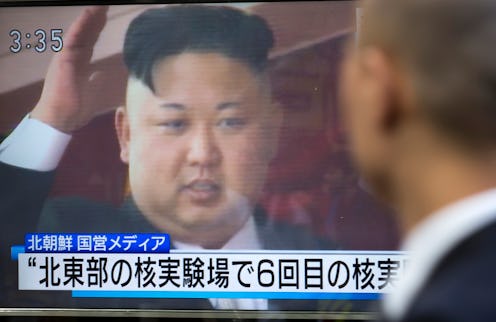
The location of the 2018 Winter Olympics is pretty remarkable when you consider just how close it is to the demilitarized zone (DMZ) between North and South Korea. PyeongChang is about 50 miles outside of the dangerous 2.5-mile-wide buffer zone, which has separated the two nations since 1953. If Kim Jong-Un is at the Olympics, this round of games could be remembered for facilitating peace as opposed to controversy.
North Korean and South Korean negotiators met near the two countries' border before the games began and the results were incredibly positive. North Korea officially decided to send its athletes across the border to PyeongChang to participate. It might not seem like a big deal — dozens of countries easily cooperate with each other when they attend the Olympics — but it was a significant step forward. Following the monumental announcement, CNN Sport spoke with Michael Madden, a visiting scholar at the SAIS-Johns Hopkins University's US-Korea Institute, who stressed that the cooperation will reflect well on both "rival" countries.
Any effort which makes it look like the Koreans aren't fighting each other all the time, both Pyongyang and Seoul are going to embrace that. They will both look good. South Korea's President Moon Jae-in and Kim Jong-un are looking for a photo opportunity from this.
... They will use it as a cover to have further discussions and that's all we can hope for. These are baby steps. The two countries are approaching each other wearily and cautiously. This is an engagement that will be supported by Russia and China and has some approval from the United States. Do we want the Koreans talking to each other and playing sports, or do you want them killing each other?
And though lots of countries don't necessarily agree with North Korea's policies (not to mention its very active nuclear weapon program), they're backing its involvement in the games nonetheless. Just because North Korea will cooperate on an international stage though doesn't mean it'll scale down it's nuclear weapon program. Following the talks between the rival countries, in fact, North Korea representative Ri Son Kwon made sure to tell reporters that denuclearization was not an option.
All our cutting-edge weapons, including our hydrogen bomb and intercontinental ballistic missiles, are not targeting our Korean brothers, China or Russia but the United States. If we begin talking about these issues, then today’s good results might be reduced to nothing.
Sure, North Korea may have made it clear that its weapons are still pointing at the United States, but America isn't against it participating in the Olympics. Just a few days before North and South Korean officials met, Trump made a statement to reporters from Camp David. “I'd like to see them getting involved in the Olympics and maybe things go from there,” he said. “So I'm behind that 100%.”
North Korean athletes are at the Olympics, but there's a slim chance Kim will show up to cheer his team on. Like his own country, he has a reputation for being reclusive. It's why you rarely, for example, see him in photos. Still, South Korean President Moon Jae-in has made it clear that he would meet with Kim under particular circumstances. “To have the summit, some conditions must be established," he said during a televised news conference the month before the Games began. "I think a certain level of success must be guaranteed."
Whether or not Kim decides to take South Korea's leader up on that offer remains to be seen. But regardless, North Korea's decision to send an official delegation — his sister, too, in fact — across the border is a step forward, no matter how small.